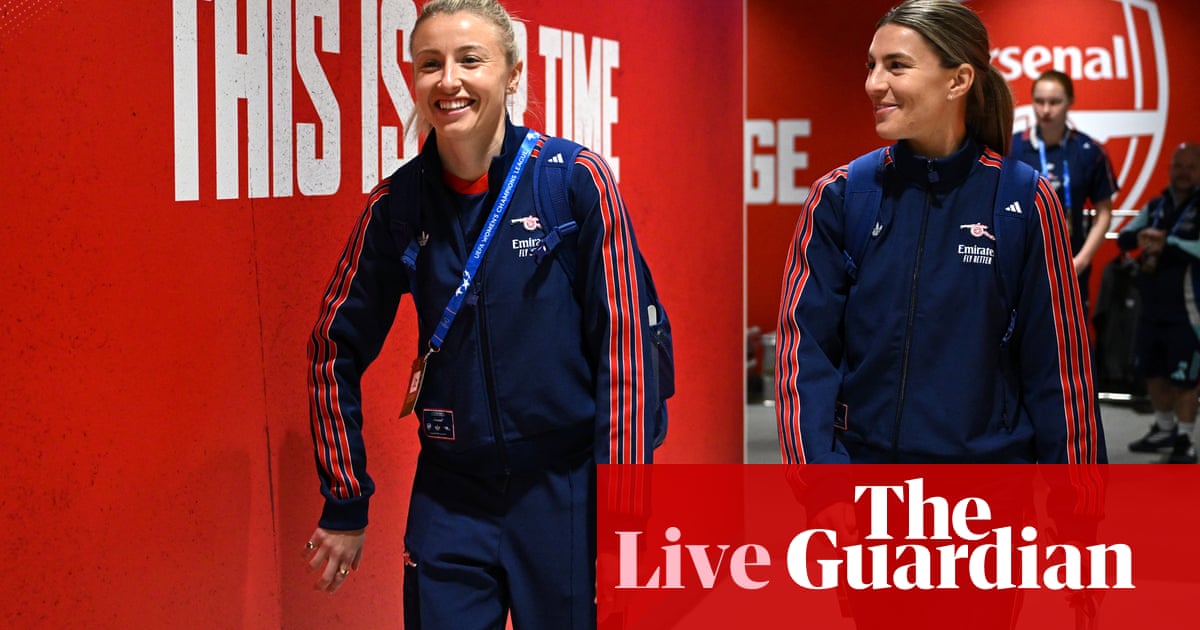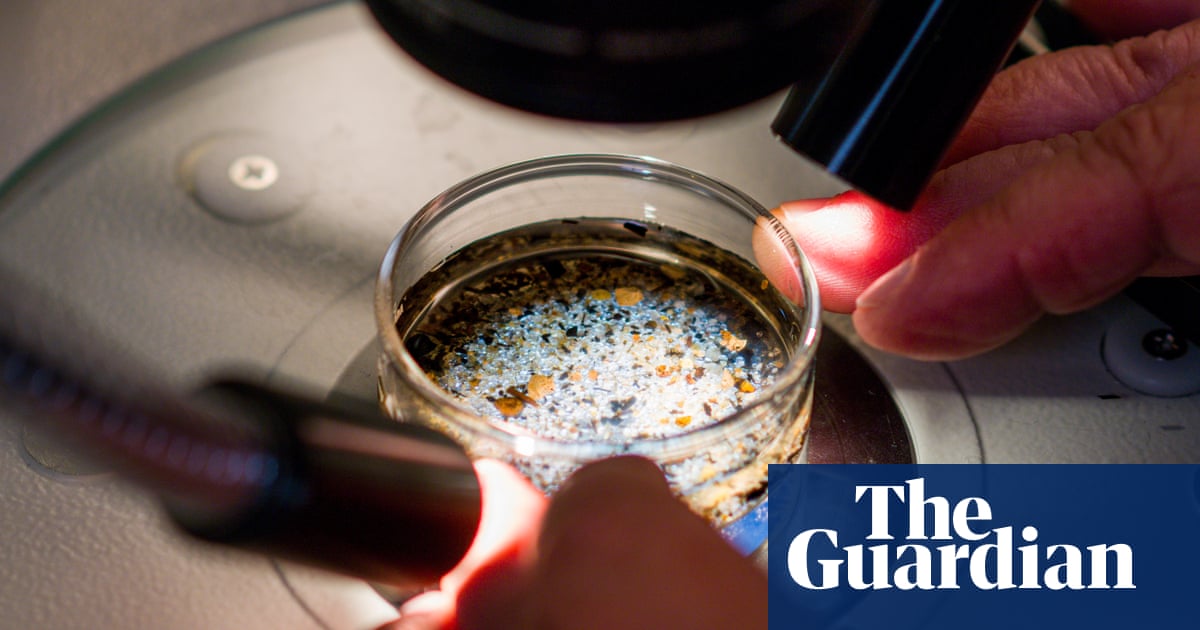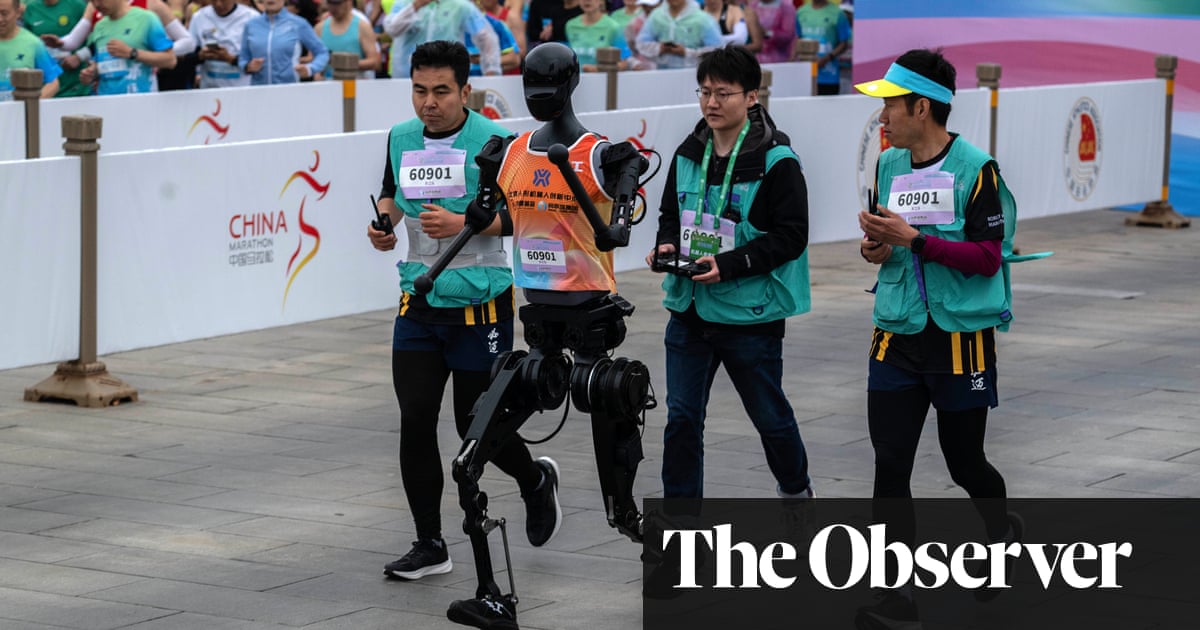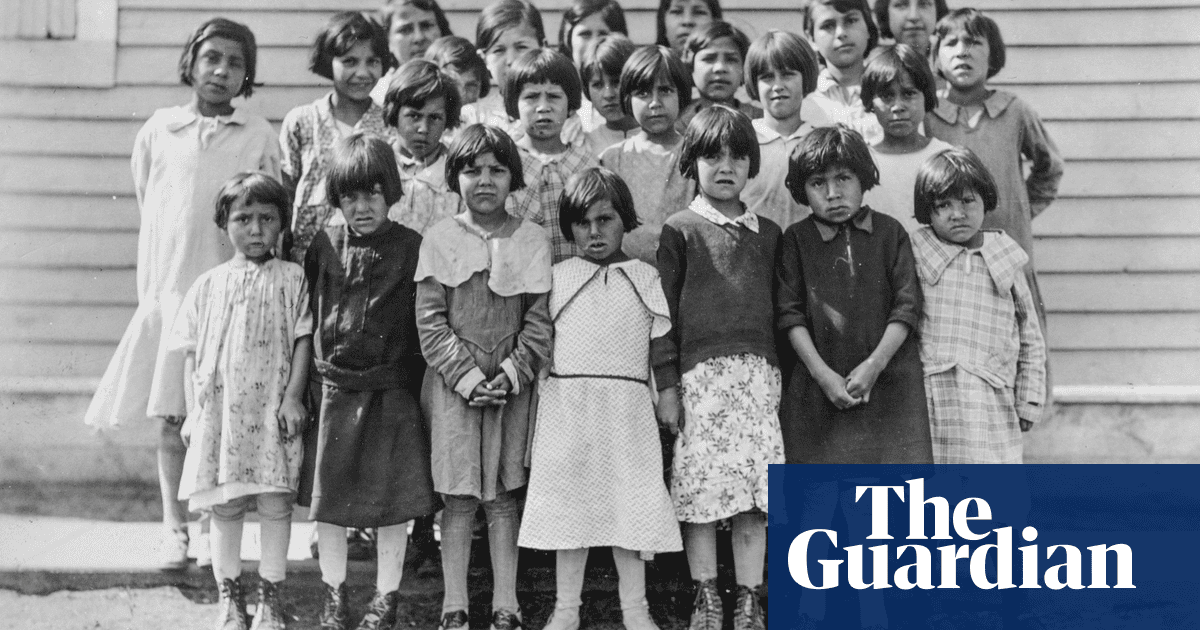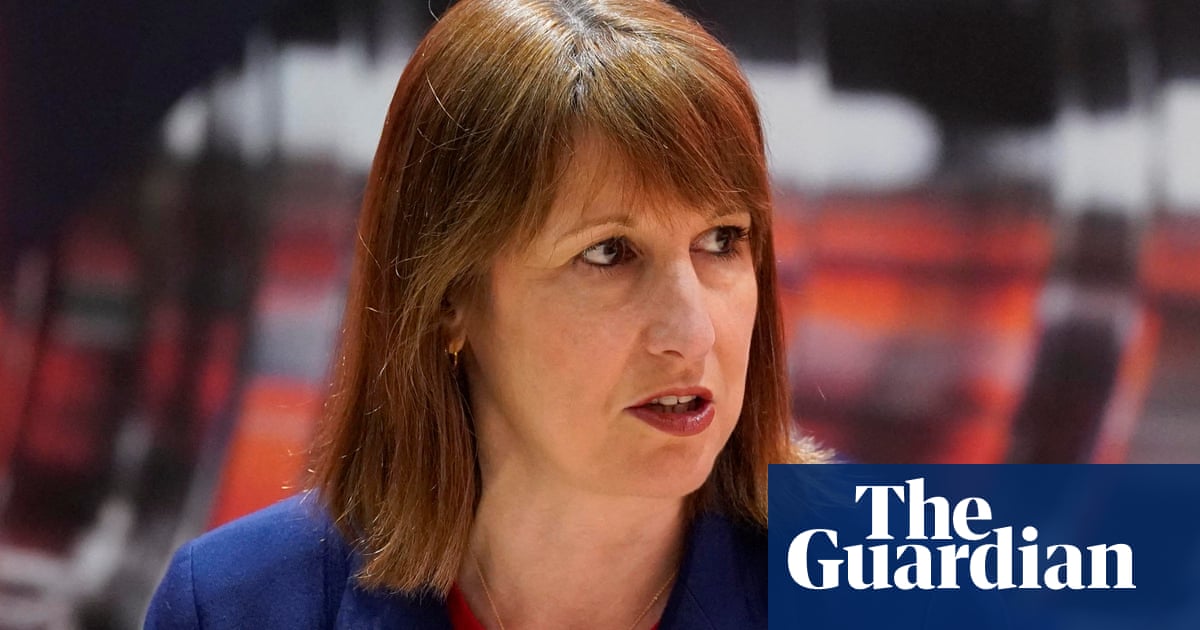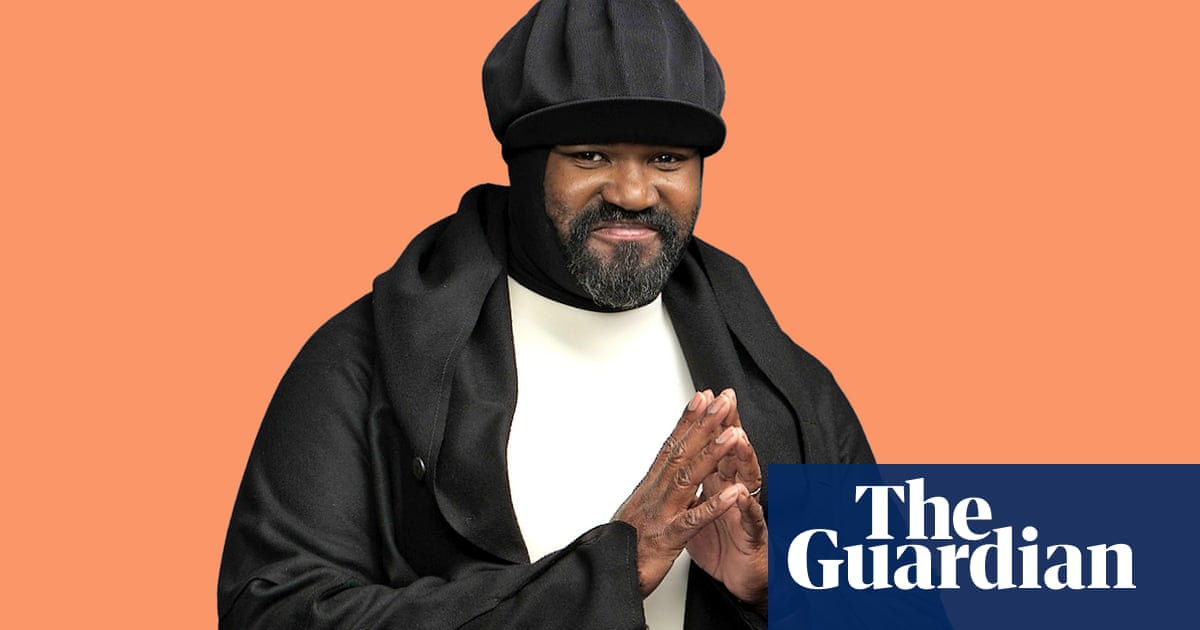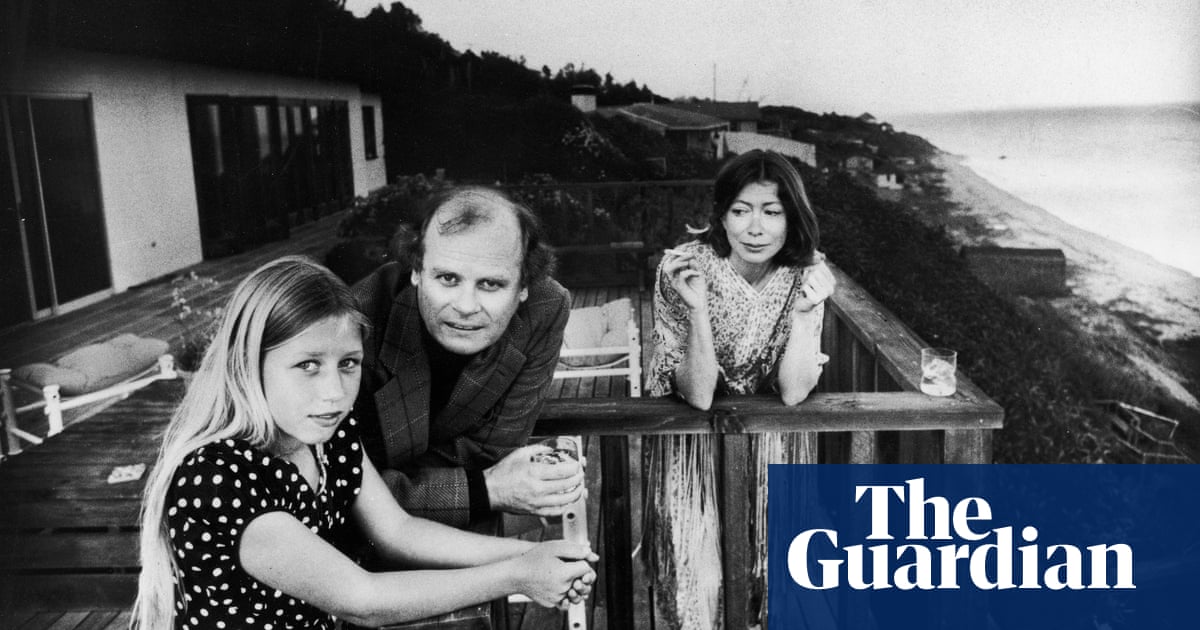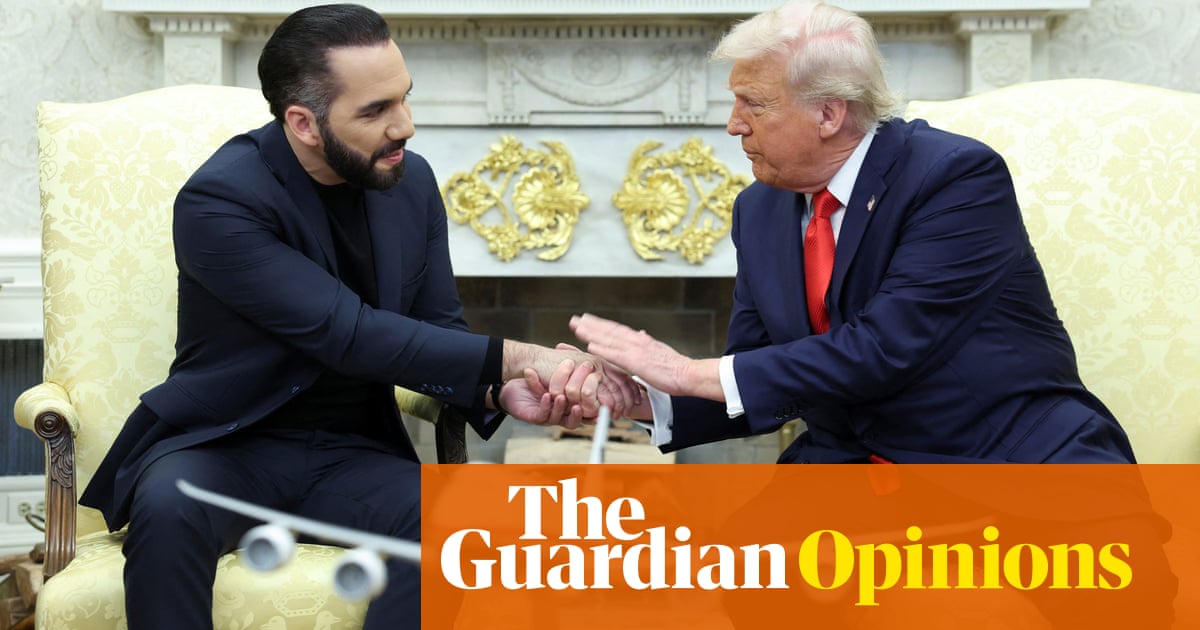Kieran Culkin tries the upright chair first, the one opposite me, high-backed and leather. But no, that’s no good. He can see his reflection in the wall mirror, he’ll be catching himself all interview, thinking how tired he looks with his hooded eyes and beard, how jet lagged. Sleep is always tricky, but he’s been up with the kids – five and three – who weren’t supposed to join him for this publicity tour but there was a last-minute crisis, the short version of which is that the whole family is over from New York (with Culkin, 42, there’s always a long and short version).
So, he flumps on the banquette, where he’ll be facing guests drinking afternoon cocktails in the low-lit, high-ceilinged bar here at the Corinthia hotel in London. He tests the firmness of the upholstery. Pantomimes boneless relaxation. Looks at me to gauge the distance between us. No, this won’t do, either. He’s too low, these people are distracting and, proximity-wise, he’s a little close. He scrambles back to the chair. Grabs the drinks menu. Muses that you may as well have the expensive thing if you’re not paying, orders champagne plus whatever trimmings, strains to peek at my notes. “Your fun notes. Notes I am not allowed to see.” He taps his phone screen, “OK, your time starts … now.” Cackles like a cartoon villain. “Yeah, just kidding.”
This rush of jagged energy he maintains for a full 90 minutes. It’s the engine of his anecdotes – he communicates in anecdote – delivered with an impressive range of gestures, accents, imitations. It can be disconcerting. My sense at all times is of being at a cliff edge. Later, he says, unprompted, “I’ve never done drugs, never done coke, I never did pills, never interested,” before correcting himself to say he smoked pot. “Not for like, 20-plus years,” but as an out-of-control teen, he once spiked a prop spliff with actual marijuana in an off-Broadway play. The entire cast, including Mark Ruffalo and an older actor who had never smoked before, were blitzed. Oh, and also: it was press night.
Most of us know Culkin – whose brother is Home Alone’s Macaulay – as Roman Roy, the caustic unfiltered “slime puppy”, youngest son of media baron Logan Roy in HBO’s hit series Succession. What Culkin brought to the role of grubby super-brat was a subtle vulnerability, bruised as well as bruiser. Roman might have been incontinent with snark, with curse-studded truth grenades, but deep down we sensed churning torment and couldn’t take our eyes off him. No one was surprised when he won an Emmy, a Golden Globe, a Critics Choice award. Deadpan, he refers to the series as “suck session”, but God, he loved that show. He bawled when it ended.
Shades of Roman’s disinhibited charm he brings to his latest role of Benji Kaplan in A Real Pain, written, directed and co-starring Jesse Eisenberg, who plays his cousin David. The pair are cousins on a Holocaust tour in Poland, honouring their Grandma Dory who survived, “by a thousand miracles”, Majdanek death camp. Eisenberg, who was nominated for an Oscar for his portrayal of Mark Zuckerberg in 2010’s The Social Network, has described it as an American buddy road story, “but fraught”. Close as kids, the cousins are now out of sync: Benji is lightly manic, unable to keep zipped the guts of his inner chaos; David is medicated restraint. It’s a combustible dynamic – and funny (it won best script at Sundance and is gathering deserved Oscars’ hype).
It was an online advert, “Holocaust Tour (with lunch)”, that gave Eisenberg the idea for his film. He thought it absurd at first, then saw the comic potential. He had already worked on two characters with the David-Benji dynamic in plays, and 20 years back, had been on a trip to Poland to commemorate those in his own family killed by the Nazis.
That Culkin isn’t Jewish was the first thing he brought up when he spoke to Eisenberg on the phone. “Jesse goes, ‘That doesn’t matter.’ I said, ‘Are you sure?’” As a consequence, he sees questions about non-Jews playing Jews as something for Eisenberg – “it’s his baby”. (Eisenberg has since told New York magazine, “I have 17,000 thoughts about this, and where I come out is that [Culkin] gave me an amazing gift by helping to tell this story that is very personal for my family.”) Nonetheless, he visibly relaxes when I tell him that David Baddiel, author of Jews Don’t Count, was in the audience at last night’s screening and has praised him on Instagram: “Kieran Culkin is I’d say an early Oscars contender,” he wrote. Culkin asks me to repeat the title of Baddiel’s book and starts typing it into Notes, before halting. “OK, I am not writing that in my phone. Somebody might take it out of context.”
A reminder: Kieran was the fourth of the seven cow-licked and petal-skinned Culkin children, farmed into acting so young, they were almost their own elementary school brat pack. Now only he and his younger brother Rory are still in the business. (Macaulay has only made a handful of films since he was 14. For a time he hosted an eccentric podcast called Bunny Ears, but now mostly writes and paints, while raising his two sons with his partner, Brenda Song).

A mark of how long Kieran has been acting is that his appearance, aged seven, alongside Macaulay in Home Alone (1990), was his second professional job. Since then, he has appeared in scores of film, television and stage roles, including Father of the Bride (1991) and The Cider House Rules (1999). He developed his own brand of anguished delinquent in Igby Goes Down (2002) and The Dangerous Lives of Altar Boys (2002), and it was while filming Infinity Baby aged 33 that he realised acting was, in fact, his career. “I thought, ‘Oh, I guess this is what I’m going to do for a living because I have no other skills. I’m serious: I have literally nothing. I’m a high school dropout. I don’t even know how the internet works. I have never had social media. I don’t know what LinkedIn is. I don’t know what Reddit is. I don’t know what things are and I’m supposed to get out in the world and get a job?’”
Right now, Eisenberg is upstairs in this hotel building, but last night they had had their big London screening. Culkin was exuberant because his Succession friends had come along. He drank martinis with J Smith-Cameron, who plays general counsel Gerri Kellman, with whom he has an inappropriate flirtation on the show, and hammed it up in front of a swooning superfan. Culkin had also been telling the show’s creator Jesse Armstrong how Eisenberg had hired him for the part of Benji without an audition. Eisenberg had never seen Succession, or anything else Culkin had been in, films or plays. “He’s like, ‘I’m aware of you. I’ve met you before,’” Culkin says. “And I said, ‘Yeah, fucking twice in passing.’ I said he was very good in a movie. And he liked that.”
Culkin leans in, tugging the hairs of his beard. “So, Jesse Armstrong goes, ‘But, hold on: the movie lives or dies on who is cast as that part? I go, ‘Yeah.’ He goes, ‘So, I think that’s bullshit. I think he’s lying. I want to get to the bottom of it.’
“What’s funny is, I then had to go and do a live Q&A and so I repeated all this to Jesse [Eisenberg] on stage. I said: ‘Jesse Armstrong thinks you’re lying, and he wants to get to the bottom of it.’ He goes: ‘I’ll get to the bottom of it now. It’s absolutely true.’ I didn’t know Jesse Armstrong was by now sitting in the front row of the Q&A. He yells, ‘You’re lying.’ I was like, ‘Oh, good, you guys can meet now.’” He collapses back in his chair laughing.

It was, in fact, Eisenberg’s sister who, after he sent her 30 pages of script, said, “Hire Kieran Culkin.” But too much tickles Culkin about Eisenberg. He has perfected Eisenberg’s frown, head scratch and anxious-earnest way of speaking, and role-plays both their parts when relating their interactions. Like the fact that during filming, Eisenberg would ask after every shot, “‘Did I look ugly in that?’ Specifically, ‘ugly’. ‘Do I look like a person, or do I look ugly?’” Or the fact that Eisenberg is so perfectionist on set that he would “analyse everything, prepare everything; be a nervous wreck in the moment leading up to, including and after the thing he’s doing”.
Culkin, by contrast, learns his lines minutes or even seconds before delivering them for real. He finds it impossible to stand on the mask-tape crosses on the floor, nor can he necessarily keep to the exact words in the script, or deliver the same temperature of performance each time the clapperboard snaps “because just on a whim, something else would happen in my body”. Days into filming, Eisenberg knocked on his trailer, looking perplexed. “He kept asking me if I was nervous about something. I was like, ‘No.’
“‘Do you need me to give you the script? You know the lines?’
“‘I don’t know lines, but I will, don’t worry.’
“‘We’re shooting in 10 minutes.’
“‘I’ll know them. Don’t worry.’ He thought I was kidding. I’m like: ‘I’ve read it, I know it’s good; I don’t want to think about it, I just want to do it.’ So Jesse takes a couple steps away and comes back. ‘Did you think when we shot this that you and I would be alike?’
“I go, ‘No. Not at all. Why, did you think we would be alike?’
“He goes, ‘I did. I did,’ and walks away scratching his head.”
The waiter asks if Culkin wants to taste the champagne. “I’m sure it’s fine,” he says. “I’m just going to drink it whatever.” He eats a few olives, and then says that, actually, he and Eisenberg do have similar sensibilities, similar tastes in film and theatre, a similar sense of humour – except that Eisenberg likes to lean away from a joke. He also adds, maybe because he doesn’t want to sound like a douche, that the way his brain works means he has to learn his lines rocket speed (an eidetic method that startled even Brian Cox, the veteran actor who played Logan Roy). Beyond that, his feel for his roles is instinctive. Meaning that he might throw out a line he feels the character might say – be it Roman or Benji. Eisenberg has since said that while initially disorienting, some of the best scenes were shot in this way.
Culkin absolutely does not want to talk about craft, or how he does what he does, or where his talent comes from. “If it’s working –” he shrugs, fingers pointing upwards like a Roman Roy gif. He has said before that it’s not his style to draw directly from his personal life and describes playing Benji as, “It’s just coming off my face or out of my mouth or whatever.”
What he will say is that he finds it boring watching actors trying to feel feelings on set. It’s dumb, he says, because that’s not how it is in life. “Most people aren’t even aware what they’re feeling as they’re feeling it. Or they’re leaning away from it while interacting with other people. It makes me cringe when I watch a movie and it’s, ‘Oh, look how sad this guy is.’ Wouldn’t he be concealing that?” So, despite not being able to regulate his emotions, “Benji’s trying to have a nice time,” he says. “Which was fun.”
He says he mostly learned who Benji really was when he sat in a screening room and watched the finished film. He had inhabited the character so closely that it was only with perspective that he realised, “I wanted to punch this guy in the face.”
Of course, there are always going to be people who compare him to his characters. He has a standard retort: “I can’t help it that we have the same face and voice.” In truth, even his wife (Jazz Charton, whom he met in a bar in 2012 and eloped with a year later on a road trip) sometimes queried the blurred line between Roman and Kieran. “That sounds like you, is that your line?” she’d say after watching episodes of Succession. There are also a million examples of him being impulsive and/or mischievous, Roman-style. Such as the time J Smith-Cameron was being interviewed on the red carpet by Variety and he interrupted to ventriloquise, “And I love Kieran Culkin and he’s my absolute favourite,” before kissing her on the lips.

Or one time he met Eisenberg before this film and they were both auditioning for the 2009 romcom Adventureland and on a whim held on to Eisenberg’s nipples even after the director said cut. Or a few weeks ago when he turned up at the 92NY – the Manhattan institution at the centre of controversy after it cancelled a Pulitzer prize-winning author for criticising Israel – dressed in black and wearing red, green and white plasters on his fingers, which happen to be the colours of the Palestinian flag.
He has said that he judges quickly, doesn’t always wait before sharing his opinion and once called his Anglo-French mother-in-law “the interrupting goose” on account of the noise she made before speaking. The big difference between him and Roman, however, is that he tries to shut off the part of his brain that might insult someone. Oh, and Roman “has never had to suffer any consequences”, he adds.
I ask what the consequences were to getting the cast high in the James Lapine play The Moment When. He winces. There was a bag of fake joints and the temptation was too great to switch one with the real thing, he says. It was 2000. “I was 17 and stupid.” Backstage weeks later, he was hit by the unmistakable smell and thought, “Uh-oh. I believe it’s happened.” He ran to the wings and “just watched” as Mark Ruffalo took big actorly draws on the supposedly fake joint before passing it to his co-star.
By the intermission, Culkin had some explaining to do. “I’m like, ‘I thought this was a good prank. I’m stupid. Oh my God, I’m so sorry.’ But actually, they loved it. Mark says, ‘I haven’t smoked pot in 10 years; the second half’s going to be so much fun.’ There was this other actor who had never smoked pot in her life. She goes, ‘Is this what being high is? This is lovely.’ And then Phyllis Newman comes in and goes, ‘I haven’t smoked pot since the 1960s. Thank you, darling.’
“Then the stage manager comes stomping in and goes, ‘I don’t care whose it is, or what happened, but Kieran, give me the joint. I sheepishly handed her the roach and she said, ‘Ruin your life on your own time.’”
Presumably he never pulled a stunt like that again. He smirks. “Years later I was with Colin Hanks doing This Is Our Youth in London. And I joked that I was going to do the same thing. And he’s like, ‘Are you fucking kidding me? If you ever do something like that, I swear to God, I’m going to punch you in the face.’ But then towards the end of the run, I said it again and he shrugged like he was saying, ‘If you do, it might be fun.’ The thing is, his character has to roll the joint every night on stage. So, one day I hand him the real pot on stage and I see him, like, react. It looked like he was excited. But then he got too excited and got nervous. And his hands started shaking so much that he couldn’t get the joint rolled, and when he tried to light it, it fell apart. Thankfully, we had a pre-rolled fake joint behind him, so we ended up with that.”

Culkin takes in my expression. “I know, I know. But I was young. I’m 42 now. I know better. I’m not going to try to get anyone high on stage.”
His phone vibrates and he says he doesn’t want to be rude but his wife is texting, it might be about the kids. His face jumps with delight: “Oh, look, she’s sending me pictures of them.” He wants to know how old my kids are so we can compare notes, tells me I am a maniac for having had three under three-and-a-half, then seems a bit disappointed when I explain they are older now and out of his experience range. He asks what age kids get phones, because this is a worry, then supplies me with funny stories, including one “that I probably shouldn’t say on record” about the first time his daughter used the F-word, which was bad, but also impressive because, “like, she used it right”.
One US journalist called him “the wife guy” on account of how often he brings up Charton, who is originally from Shepherd’s Bush in London. Culkin says Charton “gets me good”, that she is super funny, that “she fat-shames me” and then he starts an anecdote but cracks up so hard he’s almost weeping and I can’t hear the punchline. In early shots of them roaming New York City together they look like teenagers – him in a Goonies T-shirt, her in leggings and Marant wedge trainers – and until recently, when they moved to Brooklyn because it was ridiculous to be in a one-bed with two kids, they lived in the same Lower East Side apartment he’d had since his 20s.
He has said before, and he says it again now: he wishes he could be a full-time dad. He got into trouble with Charton for asking whether they could have more kids as he picked up his Emmy on live television. “But I loved being one of seven, that’s why.” Their first was a wonderful surprise, he says, because they were both convinced that they couldn’t conceive, “because we’d been together for eight years and never took precautions”.
He hasn’t slept much since, but then he never slept that well. “I have a friend who had kids a couple years before me, and he goes, ‘By the way, it’s every cliche: your meaningful life goes through the roof, your quality of life goes in the toilet.’ There’s no avoiding that at the beginning. Now it’s obviously easier. My quality of life is not in the toilet any more. It’s fine.
“I had another friend who was like, ‘Trust me, you’re going to re-examine your life. You’re going to be thinking back to your parents and how they did it. I haven’t done that.” Oh, except for one thing: he was reminded the other day when he saw his daughter experience embarrassment, of an early vivid memory of the Home Alone set. They’d shipped in trucks and trucks of real snow and spent hours laying it on the lawn, all the while testing Culkin’s childhood patience to the limit. “And I’m supposed to walk around this walkway, but instead, I run through the snow, and I hear a whole crew of people yelling, and I don’t know it’s for me. Eventually I stopped. And they’re all looking at me, and I ruined the set. They had to figure out how to get me out. They’re like, ‘Don’t. Move.’ Somebody walked into my footsteps to try to make the same hole to minimise the amount of damage. I remember feeling so embarrassed. It took another hour or so of them laying more snow and making it look perfect. And it was because of me; my fault.”
I’m surprised to hear how much he loved his childhood – much discussed because of his father Kit Culkin’s treatment of Macaulay. By all accounts Culkin Sr, a Broadway actor, was a cad, a bully and a brawling drunk, “physically and mentally abusive”, to Macaulay, according to his memoir. Kit Culkin left the family when Kieran was 12, 14 years before Kieran’s sister Dakota (Cody) was struck by a car and killed in California (“I think about her all the time and I go visit where she’s buried often”).
Despite his dad, Kieran is a conscientious parent: a while back, Charton wrote on Instagram under a picture of him: “Happy Father’s Day to this DADDY. Considering he didn’t grow up with a good example of what a dad is he’s really quite good at it.”
Culkin laughs at the idea that they might have done family therapy. “Us siblings, we’re already cooked, we’re baked. My godfather has this thing, he goes: ‘I will fully indulge anybody that wants to complain about their upbringing and childhood. I want to hear everything about that. And you can completely blame your parents for everything until you’re 30, and then figure shit out.’ He’s oversimplifying it, but I like that.”

Anyway, he says, his mother, Patricia Brentrup, is incredible. He credits her entirely with bringing them up, the affection, making sure even in their number each felt special. “If I wanted chocolate milk light, but my brother wanted more chocolate, and my sister wanted hardly any, she would make it those different ways. I love that shit.” Does he look back and think … ?
“… How did my mom do it? Yeah. And I have no idea.” As well as getting them up, washed, dressed and fed, she got them out every day, and after school their friends all piled round. “So, 15 to 20 kids in the house. I can’t believe I’m back at the grocery store sometimes three times a day. My mom had to do it on coupons. She would get cheap liver at Key Food, two giant gallons of milk, all that. For me, getting them to sleep is enough.”
It was a childhood of extremes. On the one hand, seven kids were squashed into one bedroom, sharing bunks – Kieran on the bottom with Macaulay. On the other, they were on big movie sets and flying by helicopter to Michael Jackson’s private amusement park, Neverland. The singer was later accused of sexual abuse going back decades by boys as young as seven. In a 2005 criminal trial, Macaulay testified as a character witness and in 2020 told Esquire magazine, “He never did anything to me. I never saw him do anything … If I had something to speak up about, I would totally do it.”
Kieran went a bunch of times to the Neverland Ranch, first on his own with Macaulay, and subsequently with all his brothers and sisters. “It was like the best place to go play, and we all had each other, too,” he says. “Michael was there, of course. He was really nice.
“What’s funny is, I went in a helicopter and, as an adult filming Succession – not fun. Terrifying. As a kid, it was just fun. I was like, jumping up and down, asking if they could flip it upside down. And they’re like, ‘No.’ And I said, ‘Could you try?’ And they’re like, ‘No, you can’t do that with a helicopter.’”
On reflection, I wonder if his helicopter anecdote isn’t a neat way of saying something about the way situations appear very different when we’re young.
Today, all of Culkin’s career decisions are weighed against whether or not the time spent doing something else is worth being away from his kids. “I’m not good at being separated from my family. I’m very much terrible at it.” He tells me a story about him trying to put on a brave face as he said goodbye to them at an airport once, then breaking down so completely, someone stepped in to ask Charton if he was OK.

So, he has a rule: no more than eight days away. It’s why it was difficult coming to London these past days, why he is staying in New York for his next job on Broadway, why A Real Pain was such a wrench. There are long and short versions of the number of times he tried to pull out of the film. Emma Stone, who produced it and whom Culkin once dated, did what sounds like military-grade psy-ops on him. She told him it was fine for him to pull out, reassured and soothed him, saying that she totally understood that he needed a break after filming Succession. “She was really lovely. I asked if there’s any reschedule. She goes, ‘No, there’s no chance of rescheduling, because of the budget. I was like, ‘Well, I’ll help you find another actor to play Benji. She goes, ‘No, no. If you back out, the whole thing falls apart.’
“I was like, ‘What?’
“She goes, ‘Yeah, but that’s not on you. You shouldn’t feel that pressure.’
“I said, ‘Are they in Poland?’
“She goes, ‘Oh yeah, they’re scouting locations. They’re prepping, they got the wardrobe team, everyone’s out there.’
“I was like, ‘Oh, so a lot of people are out of work if I back out of this?’
“She goes, ‘Yeah. But that’s not on you. That’s our job. We’re the producers. You have to do what you got to do, and I respect your choice.’
“I was like, ‘OK, great.’
“We got off the phone and I just felt this heavy weight, like somebody just outmanoeuvred me. Next thing I was calling my wife. ‘Ah, shit, honey, we’re going to Poland.’”
Eisenberg said day-to-day he never knew whether Culkin would turn up on set, even in Poland. He said the actor was “a mercurial, unknowable, unpredictable person” but that when he did show up, “it would be the greatest performance I’d ever seen … On set he’s just this open emotional wound. Who also can be witty.”
Culkin says even the worst days with the kids are the best in his life. The thought that they are one day going to be grown up devastates him and he imagines a scenario where his daughter is 11 and he asks her to come to Atlanta because he has a job there, and she says, “‘No, I don’t want to. I’m in school. I like my friends.’ I’ll be like, ‘Oh shit, that’s right.’ One day the kids are going to get older and not want to be with me.”
So, he embraces each ounce of chaos they bring. His son gets car sick, so for every Uber trip he has to bring vomit bags and changes of clothes as well as garbage bags. He regales me with taking them to and from a kid’s party the other day, where juggling the car seat and the bags of vomit and trying to get his daughter to hold his son’s hand when they are walking, because his son hates walking, and then they start squabbling. “But honestly, that’s calming for me.” He even loves unpacking for them here at the hotel, setting out their teddies and toys, “laying out the diapers, stuff like that”.
All the big stuff like Trump, or climate, or war, or phones, it’s too much, he says, it’s overwhelming. He’ll switch on the news, “Watch for 10 minutes and go, ‘Oh, we’re all fucked. Got it.’ Like, that’s the narrative. I try not to dwell on it too much. It’s hard enough just having a job, raising kids as closely as I possibly can, managing a marriage.” So, he puts all the big stuff on pause and focuses on things in his immediate vicinity; staying sane by getting through life “moment to moment”. For instance, he says, taking stuff out of the dryer and folding it, putting it in a pile, and then working from the pile until it comes out of the dryer again. “That’s it.” That’s how you cope? “That and alcohol.”

 3 months ago
58
3 months ago
58
